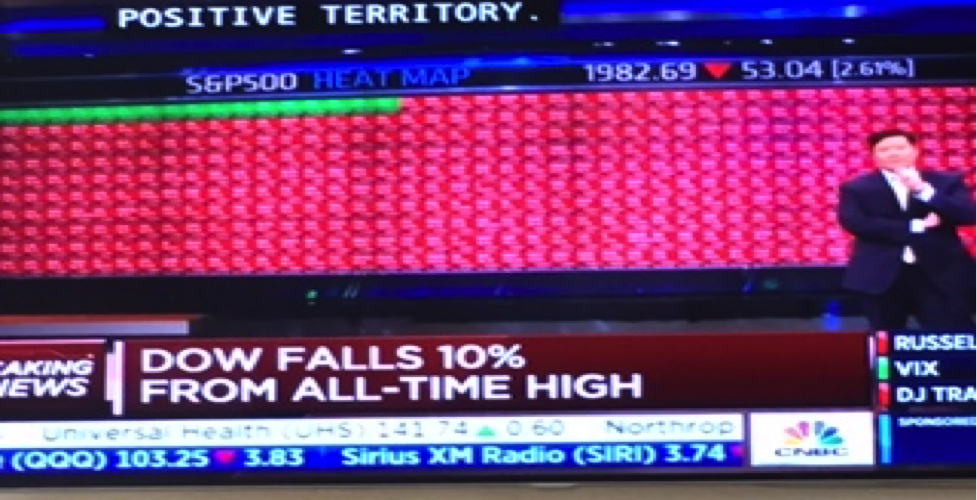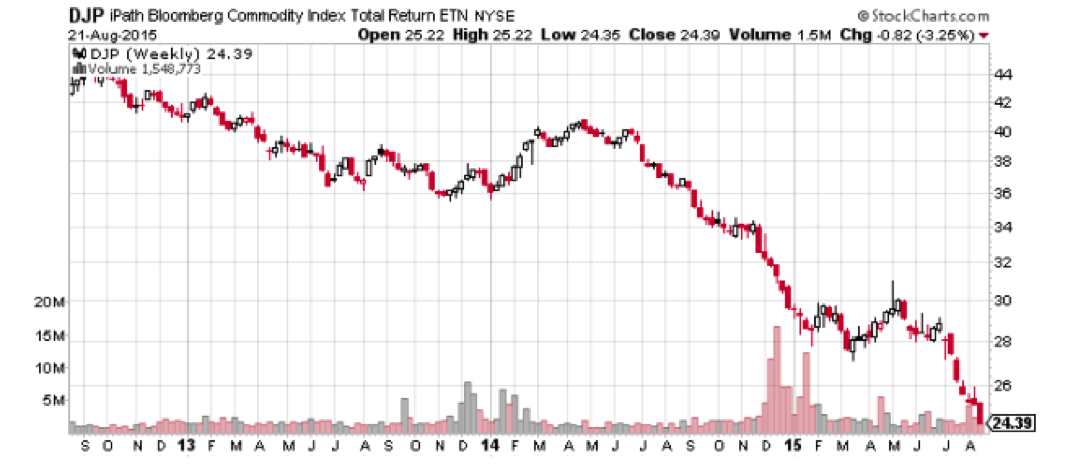Over this past weekend, I shared a special report with clients, discussing with some detail their current holdings and explaining our approach during this time of equity (stock) market correction. Below is an edited version for use by the public:
The US is basically being pulled down by the rest of the globe, in particular the Chinese equity markets which have experienced a dramatic sell-off in the past few weeks. The important global energy sector hit an air pocket about a year ago, but expansion in technology, building, and autos, online retail and consumer spending kept employment rising and U.S. stock indexes summited to real all-time highs in May. The current correction is broad-based, meaning your specific stock holdings are not being singled out but rather, this swoon appears to be one of the periodic adjustments in the prices investors are willing to pay due to the anticipation of lower future earnings.

The Vast majority of publicly traded Standard & Poor’s 500 stocks were in the red on Friday August 20, 2015
Markets of all sorts behave this way from time to time: As the price of homes was spiraling downward nationwide in 2009, a friend of mine, who owned a beautiful home with private stairs descending to Thousand Steps beach in Laguna Beach, for which she’d paid $23,000,000 in 2005, was getting no offers, even with the listing price reduced to $16,000,000. Did this mean the house was in a bad location or somehow flawed? No, “the market” decided, for a while, that beach front real estate was not worth what is once had been. After six years of economic recovery, comparable homes are now “worth” over $20 MM once again. Things just go that way.
If this becomes a protracted correction, the coming days and weeks will find the media spotlighting a few geniuses who predicted this “crash”, some of whom will make the case for a new bear market and perhaps for a financial meltdown. When I hear such performers, my eyes drift to my bookshelf and the tattered cover of the 1974 book How You Can Profit from a Monetary Crisis, one of a series of Harry Browne books that predicted the collapse of the U.S. dollar, the financial system and our government back in the days of high inflation and a prolonged bear stock market. His principal prescription: own gold and silver. That book propelled me into the financial world. Gold and silver and other commodities were profitable investments in the second half of the 1970’s but with time I learned that Mr. Browne’s outlook, which at first made sense, was a limited guide to investing. I wish I’d stumbled upon the Berkshire Hathaway annual report, penned by Warren Buffet, back then, but they weren’t promoting it in bookstores. Buffet was buying good businesses at bargain prices during the multiple stock market swoons in the 1970’s. Awareness of Buffet and his mentors was to come later and has helped guide me through the periodic market panics.
I, for one, believe this selloff to be a normal part of a secular bull market, eventually setting us up for a buying opportunity. But it could get rougher.
Here’s a telling Buffet quote: “be fearful when others are greedy and greedy when others are fearful.” This week’s fear may not yet be deep enough to mark a bottom, but I am finding certain potential investments more tempting than they were just a few weeks ago. I suspect we may be in for some months of poor performance before a capitulation phase marks the turn around. In fact the market could dawdle for as much as another year.
Before commodity consuming nations, like the U.S., Europe, Japan, China and India can benefit from low commodity prices, there will be companies and nations, especially third world producers and their lenders, who will suffer from diminished, export driven foreign currency earnings. Mining and resource companies will go bankrupt, governments will teeter (think Venezuela, Brazil, Nigeria) and some lender will be in trouble. I do not think, however, that we are facing a financial system freeze up/meltdown as happened in the 2007-2009 period.
The ferocity of the selling on Thursday and Friday August 19 and 20 has the feel of a summer raid. While many professional investors are on vacation it’s a wonderful time for short term traders to take advantage of a thin market and push quotations below widely followed chart points. Chartist or their more sophisticated equivalent, algorithm driven trading systems, are vulnerable to this form of attack. A good technician behaves like a robot, buying when the specified signals are good and selling when signals are bad. No judgment, just mechanical behavior. Foolish. Human beings like me try to be in touch with the underlying nature of the investments we choose: the factors of demand, supply, product distribution channels, unique company specific positives, and importantly, management talent. Even when chart points suggest a problem, I must bring to bear 40 years of experience to decide when to hold ‘em and when to fold ‘em. This is not mechanical, it is not easy, it is sometimes wrong, but it has served our clients pretty well through a number of market swoons.
Leading up to the current correction I have tried to do job number one: reducing exposure to short-term volatility. As in the past, the fundamental diversification of your portfolio serves to dampen the downside threat. I try to select better quality companies that have high free cash flow, strong returns on equity and low or modest internal leverage. Most portfolios also hold fixed income securities that usually benefit when stocks go down. Preferred stocks, for example were virtually unmoved last week. When there is an absence of outstanding investment opportunities, your allocation to cash rises. All three of these approaches are on display for your portfolio. If you compare the behavior last week of the US stock market with the change in percentage value of your portfolio you will likely find that you gave back is a lot less than did the stock indexes. Also because many of your investments were purchased at bargain prices, even this sell off leaves you with capital gains.
Is this a time to seek alternative investments? Gold? Precious stones? Classic cars? In my opinion the answer when it comes to “real” assets is “absolutely not”. Gold is the favorite of those who have little confidence in government, paper currencies or today’s modern economic system. Gold has well served those who are subject to abhorrent regimes (as it served my grandfather when he escaped Communist Russia). But I do not believe we are about to see the collapse of organized first world governments or blood in the streets. My guess is the current gold rally will be short-lived. These commodities may gain when inflation and or political unrest are rampant, but inflation is not an issue and at least here in the States, we look headed for an orderly change in the Presidency next year (but an interesting election to be sure!)
Real assets of many classes appear to offer few opportunities due to waning demand from China and a glut of oil and natural gas production. The sell – off for industrial commodities, however, is good news for industrial companies who source raw materials for their manufacturing and services.
Should you turn to real estate as an investment? My answer is: “yes, but” … I believe we are entering a secular bull market for housing driven by the 90 million – strong millennial generation. For some clients, you already have a small position destined, I feel, to benefit from this trend. We also own real estate in the form of two real estate investment trusts, both of which held up relatively well in the selloff. The one area where inflation is running hot is rents. This suggests that Millennials will be out house hunting. Therefore I am on the hunt for another opportunity that can benefit from building, buying and furnishing homes, stay tuned.
(much of the letter to clients goes on to discuss specific holdings, proprietary information of Trusted Financial Advisors. If you wish to discuss our current ideas please contact Portfolio Manager Gary E Miller at 949 249 2057 )
Those of you who have ridden through market corrections and bear markets already know my approach: own good businesses that pay us rent and be patient. Sometimes “the market” will love these companies, sometimes “the market” won’t love them. So what? You may expect regular dividends and interest to be deposited into your account, while going about the business of living. Others, who are too leveraged, not properly diversified, or poorly advised may be offering us some good deals in coming weeks and months as they surrender to their emotions- I’ll try to be alert for such opportunities!
[1] A cautionary reminder: Having suffered through owning and managing residential real estate earlier in life, I have distaste for owning real estate directly because of the management hassles and exposure to vacancies, unruly tenants, taxing authorities and endless maintenance calls. Having been “stuck” with rental property during the housing bear market of 1981-84 I frequently warn folks about the inability to turn real estate into cash when an emergency arises, which always seems to occur during a financial contraction. This sort of liquidation risk does not exist with exchange traded real estate investment trusts (REIT’s) which have been part of our client portfolios for some 15 years now.

